Research
The UConn Botanical Conservatory provides state-of-the-art research infrastructure for the study of ecology, evolution, biodiversity, and climate change.
The Conservatory supports several active research projects led by UConn faculty and students. Topics range from studying plant responses to climate change to how genes control flower development.
Many of the projects are federally funded and associated with peer-reviewed publications. Some projects are long-term, with plant collections supporting multiple studies over time.
Resources for UConn Researchers
Research Facilities
Researchers use our greenhouse facility atop the Biology/Physics Building (BPB) and the Conservatory collections. Access to the BPB facility is restricted to researchers and staff.
The BPB greenhouse facility contains ten 480 square-foot growing rooms, each with the capacity for an independently controlled climate maintained by an ARGUS system. Rolling benches provide 312 square feet of growing space per room.
Growing space is allocated according to guidelines established by the UConn Botanical Conservatory committee. Current charges for research bench space are $0.30 a square foot per month.
UConn researchers who would like to learn more about using the BPB greenhouse facilities should contact the general manager.
Research Highlights
Active Research Projects

Emeritus Professor, Ecology and Evolutionary Biology
The Anderson Lab’s two foci are the evolution of domestication and the biology and conservation implications of reproductive systems. The lab’s research has taken its members to countries around the world and to many remote island archipelagoes. Island plants uniquely combine the facility for establishment after long-distance dispersal with breeding systems that promote persistence and radiation.

Professor and Head, Ecology and Evolutionary Biology
The Diggle Lab studies plant morphology through the lenses of comparative evolution and development. Her research group has focused primarily on floral development. They also study effects of climate change on bud development in wild plants.
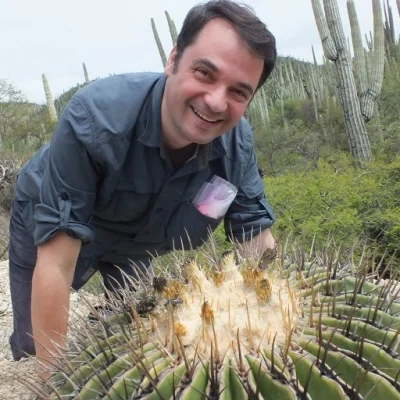
Associate Professor, Ecology and Evolutionary Biology
The Garcia-Robledo Lab studies how climate change affects plant-arthropod interactions in Central and South America. He and his students use the collection of wild gingers to study diversity in structure, chemistry, physiology, and molecular biology under common garden conditions.
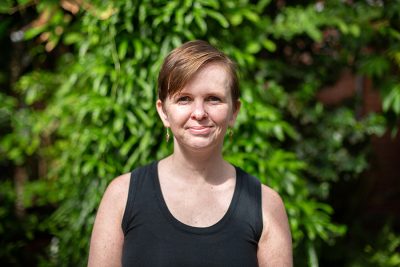
Assistant Professor, Ecology and Evolutionary Biology
The Heyduk Lab studies the evolution of plant adaptations to stressful environments. Their research focuses on the evolution of different types of photosynthesis, specifically Crassulacean Acid Metabolism (CAM) photosynthesis, using both genomic and physiological approaches.

Professor, Ecology and Evolutionary Biology
The Jockusch Lab studies the evolution of development in animals. In the BPB facility, they raise treehoppers to study the developmental genetics of the extraordinary variation in treehopper helmets.
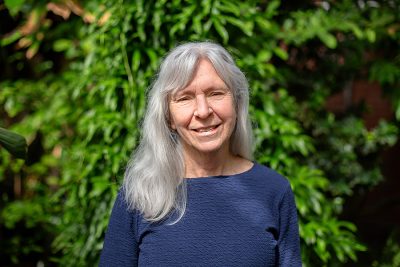
Emeritus Professor, Ecology and Evolutionary Biology
The Jones Lab studies how plant structure (anatomy and morphology) influences and is influenced by function. For several years, lab members have focused on the ecology and evolution of leaf, stem, and floral diversity in the South African plant genus Pelargonium.

Emeritus Professor, Ecology and Evolutionary Biology
The Schlichting Lab researches the role of phenotypic plasticity and genetic diversity in plant evolution from both theoretical and empirical perspectives. Their studies have explored these topics from multiple perspectives — including quantitative genetics, plant ecophysiology, and functional traits — in a range of plant systems from annual Arabidopsis and species of Phlox to perennial Pelargonium species.
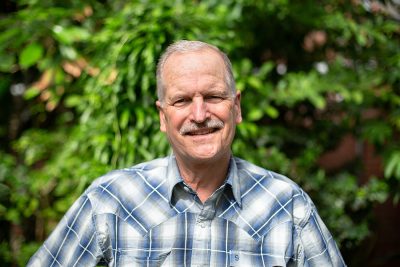
Professor, Ecology and Evolutionary Biology
Wagner’s Entomology Lab relies on the Conservatory to provide food for different species of caterpillars that they have raised for over 25 years. Additionally, the Conservatory maintains a special collection of plants from the American Southwest relevant to Wagner’s forthcoming book on western caterpillars — a project that was recently featured in The New Yorker.
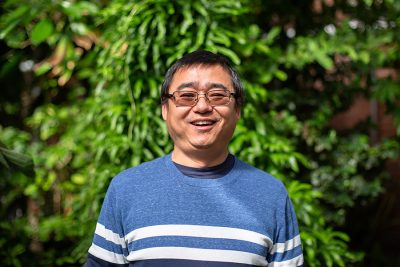
Associate Professor, Ecology and Evolutionary Biology
The Yuan Lab studies the genetics, development, and evolution of phenotypic diversity and novelty, with a particular focus on color patterns and pollinator-associated floral traits. They use monkeyflowers as their main study system.
Affiliated Researchers
Other faculty members whose students use the UConn Botanical Conservatory for research include:
- Dan Gage, Professor of Molecular and Cell Biology, whose research focuses on plant/microbe interactions.
- Bernard Goffinet, Professor of Ecology and Evolutionary Biology, who studies bryology and lichenology.
- Kent Holsinger, Emeritus Professor of Ecology and Evolutionary Biology, who studies plant evolution.
- Paul Lewis, Professor of Ecology and Evolutionary Biology, whose research focuses on phylogenetic theory and relationships of plant lineages.
- Jeff Seemann, Professor of Ecology and Evolutionary Biology, who studies plant responses to climate change.
- Jill Wegrzyn, Associate Professor of Ecology and Evolutionary Biology, whose research focuses on genome evolution in plants and trees in particular.